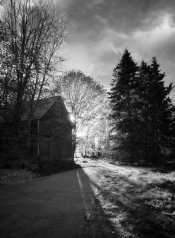To play the devil's avocado, I'd like to point out that there is *some* sort of "quality of light" that's aesthetically important, even if we don't have a good vocabulary for describing it.
To take examples that everyone knows, doesn't "Moon And Half Dome" rely for its impact on conveying a sort of "thin-air" montane brightness to the light; or doesn't "Behind The Gare Saint-Lazare" depend on the backlighting having that vague diffuse mistiness of a grey day where the rain could start back up at any time? Not always, but often, I think it's true that a successful photo needs to capture "how the light looks" in a way that's very, very difficult to say anything objective about.
AA talks about the "mood" of lighting quite a bit in _The Negative_, and IMHO he experienced an uncharacteristic failure to really say anything about it. There are a lot of examples about which the text says "here the mood of the lighting was X, and technique Y was applied to convey that", without much insight into why the viewer should see the mood as X or why technique Y would be appropriate for showing it. That's not his failing, obviously---you could look far and wide without finding an expository writer as explicit about the steps as AA. I think this "quality of light" thing is simply *that* evanescent.
Here's a strawman idea: I submit that "capturing the quality of the light" is closely related to "the viewer can tell what the scene smells like". Discuss.
-NT
To take examples that everyone knows, doesn't "Moon And Half Dome" rely for its impact on conveying a sort of "thin-air" montane brightness to the light; or doesn't "Behind The Gare Saint-Lazare" depend on the backlighting having that vague diffuse mistiness of a grey day where the rain could start back up at any time? Not always, but often, I think it's true that a successful photo needs to capture "how the light looks" in a way that's very, very difficult to say anything objective about.
AA talks about the "mood" of lighting quite a bit in _The Negative_, and IMHO he experienced an uncharacteristic failure to really say anything about it. There are a lot of examples about which the text says "here the mood of the lighting was X, and technique Y was applied to convey that", without much insight into why the viewer should see the mood as X or why technique Y would be appropriate for showing it. That's not his failing, obviously---you could look far and wide without finding an expository writer as explicit about the steps as AA. I think this "quality of light" thing is simply *that* evanescent.
Here's a strawman idea: I submit that "capturing the quality of the light" is closely related to "the viewer can tell what the scene smells like". Discuss.
-NT


 )
) 

